
EXCLUSIVE: Amnesty International Fires Osai Ojigho Following West Africa Weekly Investigation
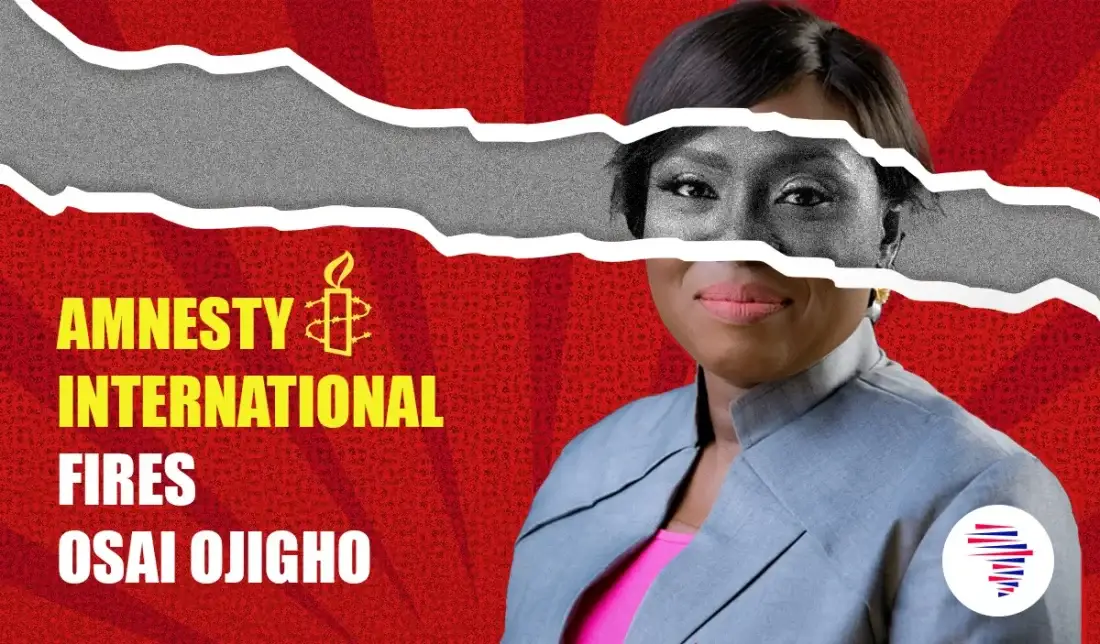
Amnesty International Nigeria country director Osai Ojigho has been quietly fired, 10 months after the organization under her watch came under public scrutiny following revelations of fraud and collusion with security agencies made by former staff members and external whistleblowers.
It will be recalled that these revelations were exclusively published by West Africa Weekly in a March 2022 long-read investigation into Ojigho’s activities at Amnesty International Nigeria. Following the exposé, Ojigho responded by threatening to sue, after which she obtained a gagging order from the National Industrial Court against former Amnesty researcher and whistleblower Damian Ugwu. She did not however, follow through on the legal threat against West Africa Weekly
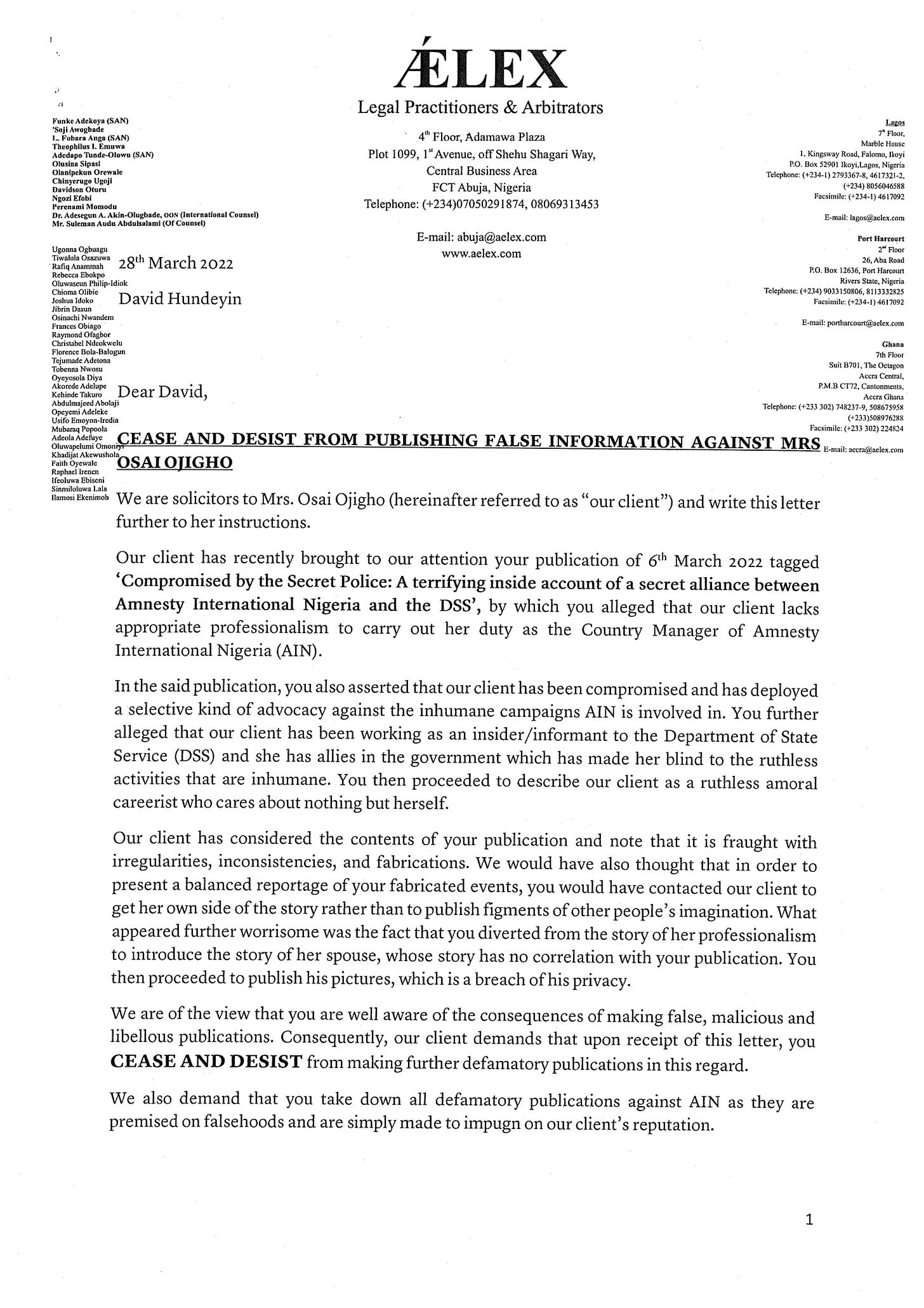
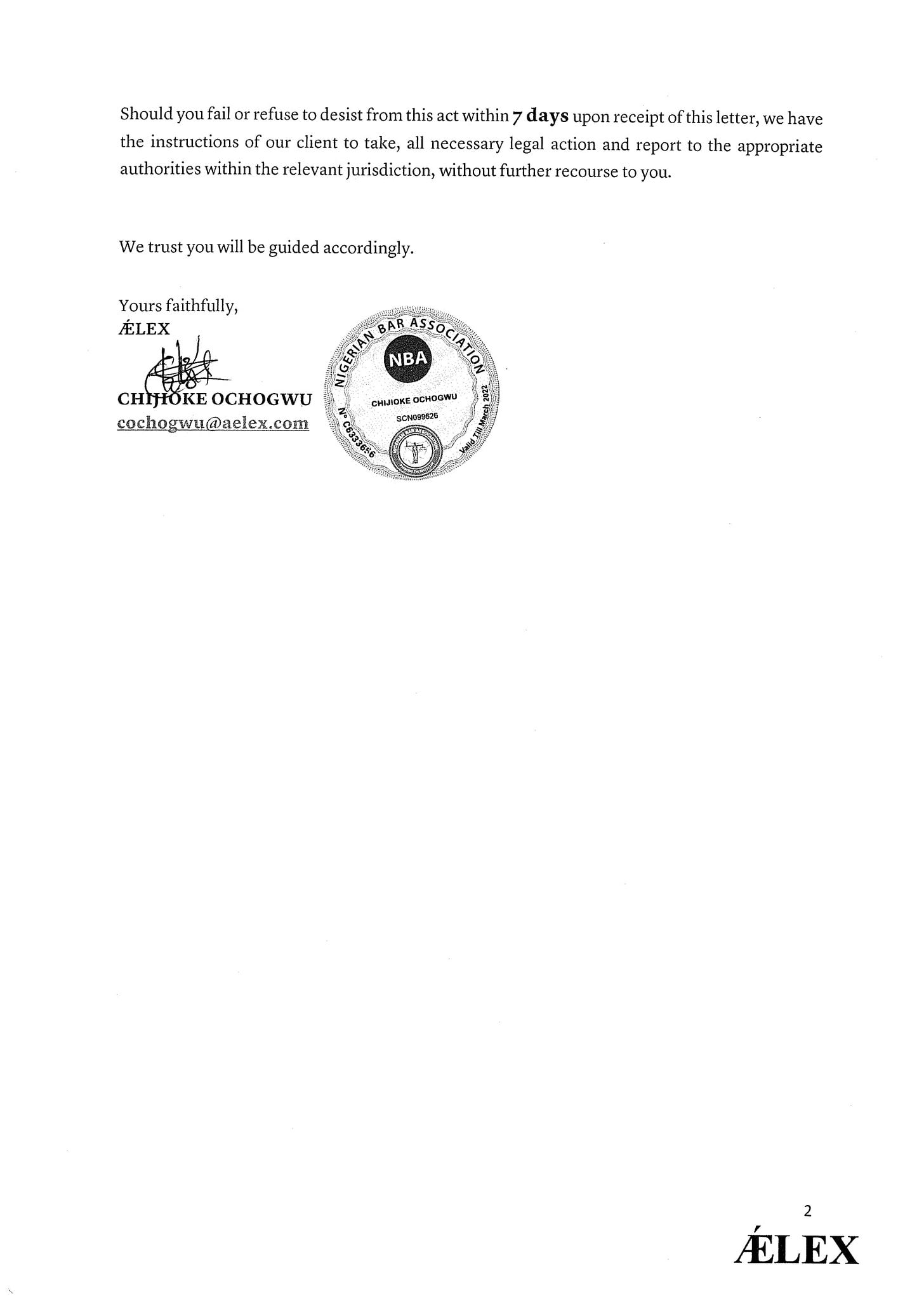
Osai Ojigho’s “Managed Exit”
West Africa Weekly learned that the International Secretariat of the organization decided that rather than pointedly sack Ojigho following the conclusion of an investigation into a series of petitions by staff and partners of the organization, arranging for her to make a “managed exit” would be more expedient. To this end, insiders revealed that Ms. Ojigho on Friday January 13 announced to AIN staff that she will be leaving the organization by March. She claimed to have received a “lucrative job offer” to work for UK-based Charity Christian Aid as an Advocacy Manager.
According to sources present at the meeting, she lamented that she was “used and dumped” by the organization, accusing that the organisation of failing to back her when she was accused of wrongdoing by some former staff who “wanted her position.” Her sack follows an identical pattern to that of her predecessor Mohammed K. Ibrahim who was also silently eased out after getting caught leaking top secret Amnesty documents to the Nigerian government.
As expected, when contacted for comment, two members of the Amnesty International Nigeria advisory board including the chairman Mr. Auwal Ibrahim Musa Rafsanjani claimed that she resigned from her job voluntarily after getting an offer in the UK.
Reign Of Chaos At Amnesty Nigeria
West Africa Weekly sources who did not agree to be named stated that Ojigho was hired by Amnesty International in April 2017 on the recommendation of a former National Human Rights Commission (NHRC) Chairman who subsequently sought to direct some policies in a bid to enhance his chance of securing a ministerial position. The former NHRC boss incidentally, was the person who facilitated her initial meetings with top security officials as reported exclusively in the March 2022 exposé.
Several insiders with knowledge of the matter claimed that after the emergence of mind-boggling revelations about Ojigho’s malfeasance including fraud, nepotism, staff bullying, incompetence, and sabotage of Amnesty International’s work in Nigeria, it was only going to be a matter of time until AIN collapsed altogether under Ojigho’s watch. Following the publication of the exposé, Ojigho quickly secured a court injunction restraining Mr. Ugwu and other staff from revealing further information about the organization.
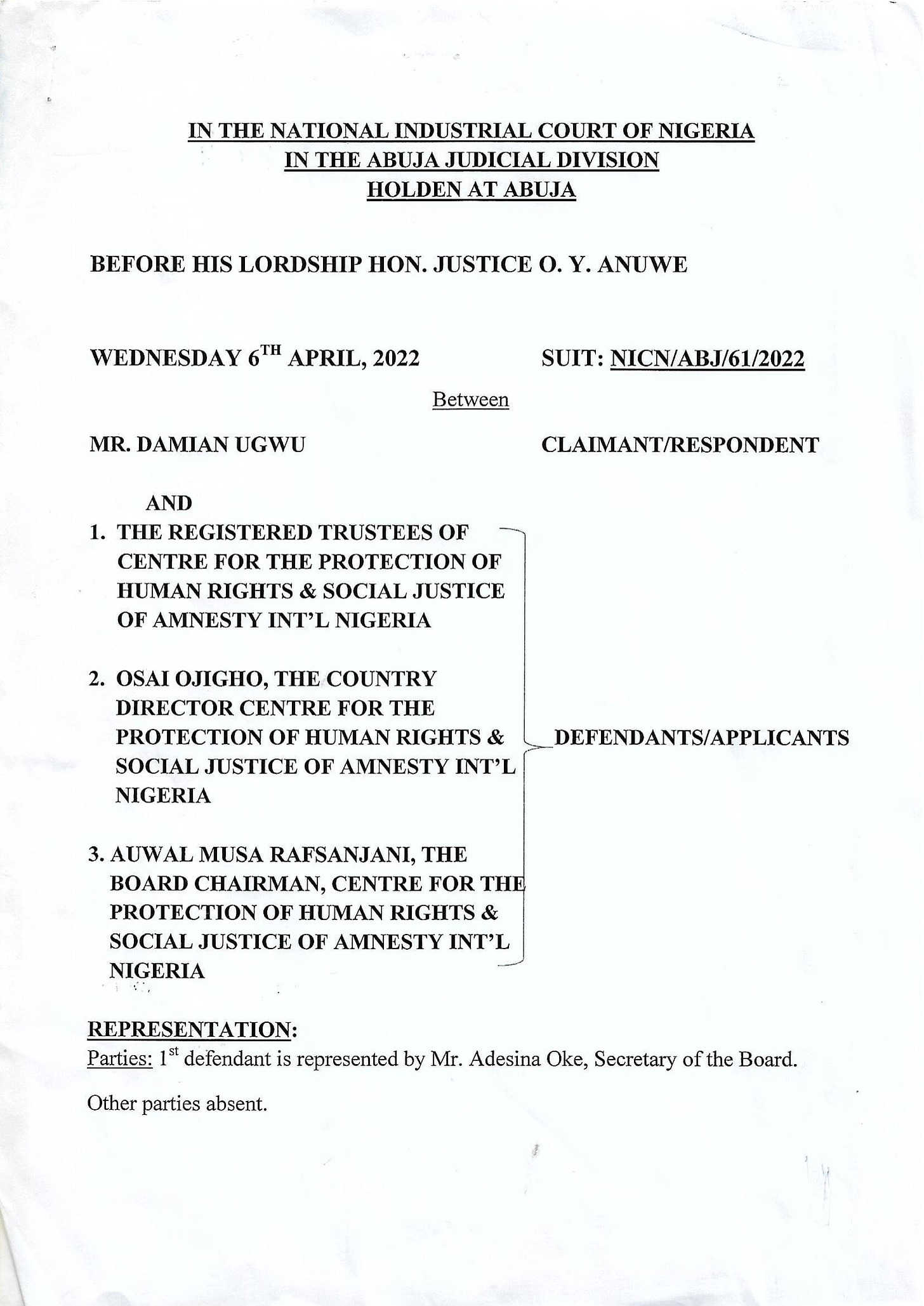
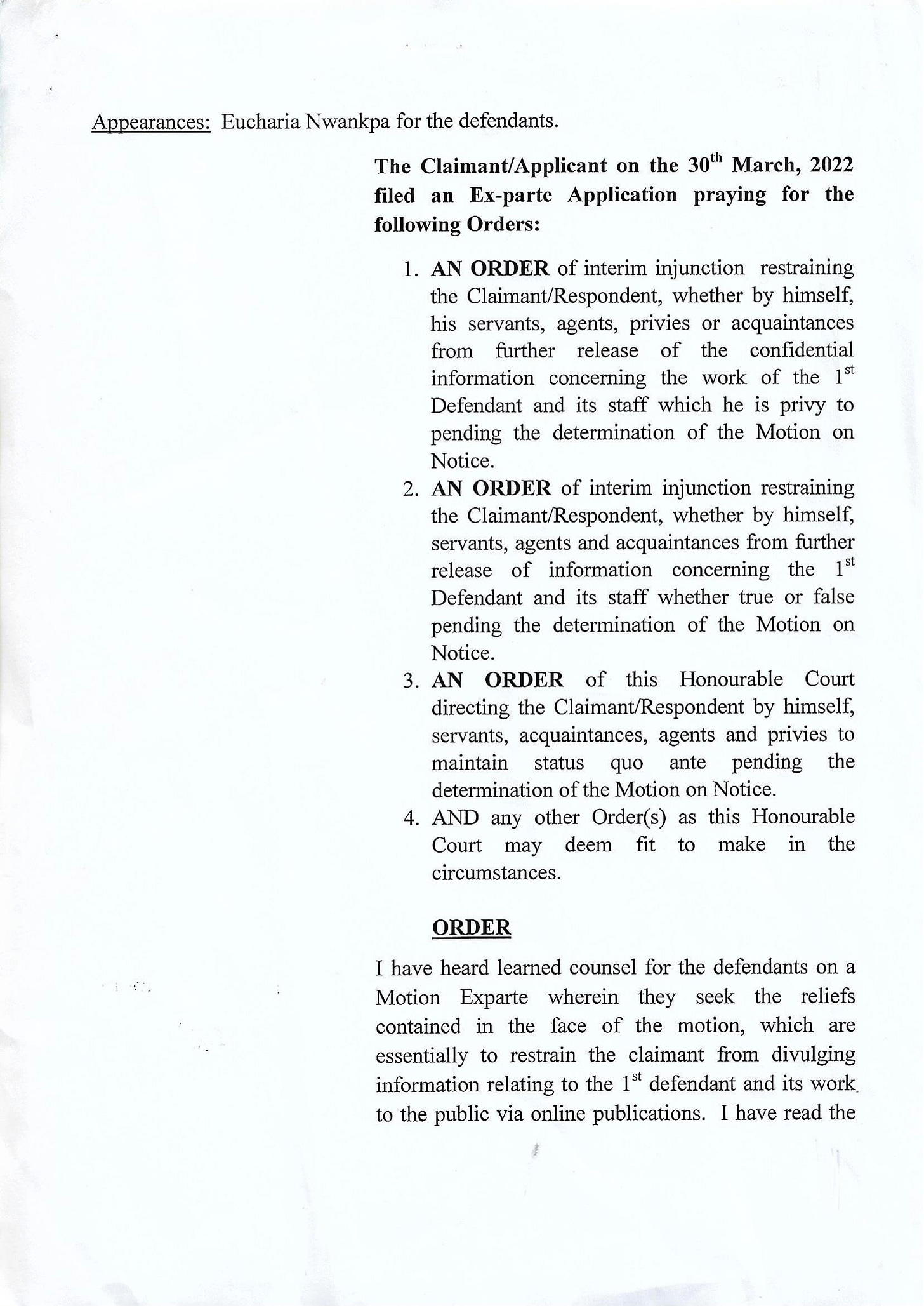
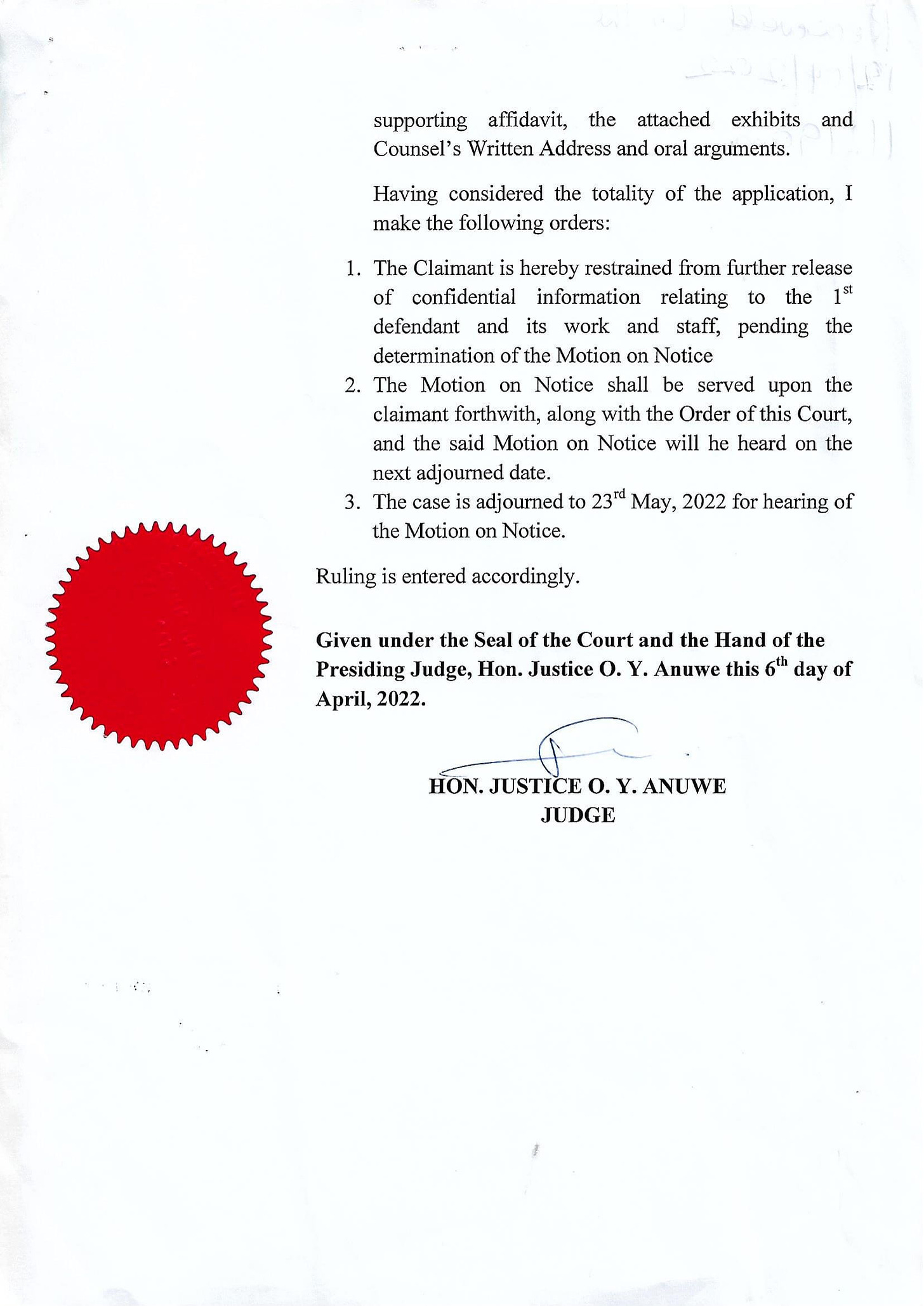
Commenting on this, the source said:
“How can a human rights organization go to court to gad someone from talking about them? They may have invariably given the government the clue to deal with the organization. All the FG had to do is to secure a court injunction preventing Amnesty from releasing reports about the government.”
As reported in March 2022, Ojigho’s destruction of the once-revered organization was long and systematic. Less than 6 months after her employment, the entire staff cohort wrote a petition to the international secretariat complaining about her leadership style. Shortly after, with the help of her mentor, a prominent activist, she began to dismantle all the structures that once made Amnesty International the nightmare of abusive Nigerian government and security officials. Two prominent female expatriate staff who helped set up the Nigeria office and were seconded to the Nigerian team to provide mentorship were disgraced out of the organization. An experienced male staff member from a neighbouring West African country was effectively cut off from the team. He subsequently left the organisation
An exodus of staff soon followed as Ojigho took total control over the organisation. While some resigned voluntarily, others were forced out due to unexplained non-renewal of their contracts. n total, about 13 staff left Amnesty International Nigeria over the course of Ojigho’s tenure – most of whom were employed before she joined the organization.
Especially prominent was the case of AIN’s renowned researcher Malik Samuel, who resigned in early 2019 citing among other things the organization’s refusal to speak about the siege on the Daily Trust Newspapers office in Utako, Abuja by security agents, and the killings and mass displacement of of civilian population by the Nigerian military in Borno state, northeast Nigeria.
Amnesty International Fails To Act Decisively
“Staff members loiters all day with no work. I can tell you that no research is going on now at Amnesty Nigeria. The staff are so downcast and lack the motivation to carry out any meaningful research. Our only output is Facebook and Twitter quotes condemning killings by non-state actors. We no longer have the courage to criticize the government or the military. Since Malik and Damian left, it became obvious that we lack institutional memory and capacity to carry out credible human rights research. They were our link with the victims and activists working on the grassroots. To make matters worse, our hard drive where we stored every information dating back to 2001 was stolen right inside our office building.
“We are currently being given cold shoulders by other NGOs and partners including the diplomatic community. We planned to launch a report on rape in partnership with the Canadian Embassy when David Hundeyin’s report was released on March 6, 2022. The following day the Canadian embassy suddenly canceled the planned launch without any reason. Since then, other foreign embassies have been keeping us at arm’s length.”
The source added that almost all the key staff are planning to resign while some of them already had other jobs. Conflict Researcher Aminu Hayatu Sanusi Jnr, alias Abba Aminu still teaches political science at Bayero University, Kano, and was identified in the March 2022 report as a DSS agent planted at AIN. Media Manager, Isa Sanusi is currently employed as Senior Special Assistant on Digital Media and Strategic Communications to Yobe state governor Mai Mala Buni, a position he has occupied since September 2020 when the governor was the acting chairman of the ruling All Progressive Party (APC). Sanusi is also the Special Adviser on media to the current Nigerian Minister of Power, Alhaji Abubakar Aliyu.
It will be recalled that Sanusi was identified in the report as a collaborator with the Kaduna State government’s attempt to silence criticism of its illegal detention of journalists Steven Kefas and Luka Binniyat. He incidentally, was caught on tape accusing Ojigho of attempting to flout organisational procedure by taking control over AIN’s social media accounts so as to stop important messaging from going out.
Another staff source revealed that AIN made a desperate effort to push back on the public backlash that followed the revelations, by contacting social media influencers including Akpororo and Aisha Yesufu to help shore up the organization’s image. These influencers the source said, all turned down the request. Incidentally, Aisha Yesufu was one of the activists banned from speaking at Amnesty International public events shortly after the #EndSARS protest, due to her consistent opposition to the Buhari regime’s policies. Other activists also banned include Omoyele Sowore and Deji Adeyanju.
Another source revealed that discontentment within the Amnesty International movement is growing rapidly as most of the European sections and staff of the international secretariat have shunned engagement with Amnesty Nigeria. According to the source, many Amnesty International colleagues in London are confused about why the International Secretariat has refused to act decisively in the face of damning allegations that violate Amnesty International principles and policies. There was talk about suspending or closing down the Nigerian office due to the scandal. When contacted, Mr. Rafsanjani admitted that the organization indeed mooted the idea of closing down the entire Nigeria office during the scandal but this is no longer the case.
Speaking in November 2022, a staff member of a European section of Amnesty International said, “There is certainly a significant drop in the quality of research output from Nigeria. Research work by AI Nigeria used to be a big hit within the Amnesty movement.”
When asked why the International Secretariat has not released the finding on its investigation of the Nigerian office following multiple and credible allegations of wrongdoings, the source said he believes that the International Secretariat is overwhelmed by trouble in various sections of the movement. In his words:
“Don’t forget that we have over 70 sections and national offices around the world. Right now, there seem to be brewing scandals in several sections including AIUSA where there were allegations of racism targeted against black staff, and Ukraine where the entire staff resigned in protest about how Amnesty responded to the ongoing Russian invasion.”
Has Bola Ahmed Tinubu Committed Perjury? The Evidence Says Yes
About The Author
Related Articles
Tinubu Deducts N100bn Monthly From Federation Account Without Approval El-Rufai Alleges Says Action Deserves Impeachment
Former Kaduna State Governor Nasir El-Rufai has launched a blistering attack on...
ByWest Africa WeeklyJanuary 26, 2026Trump’s Greenland Threat Forces Europe to Taste the Logic of Western Colonial Power
It rarely begins with soldiers. More often, it begins with a sentence,...
ByWest Africa WeeklyJanuary 21, 2026Tinubu Government Claims Intelligence Cooperation With the US, Yet New York Times Publishes Conflicting Story Following $9 Million US Lobbying Effort
When the New York Times published its investigation suggesting that claims from...
ByWest Africa WeeklyJanuary 19, 2026Mali’s Transition Leader Attends Swearing-In of Guinea’s President Mamadi Doumbouya
Mali’s President of the Transition, General Assimi Goïta, represented the country in...
ByWest Africa WeeklyJanuary 19, 2026









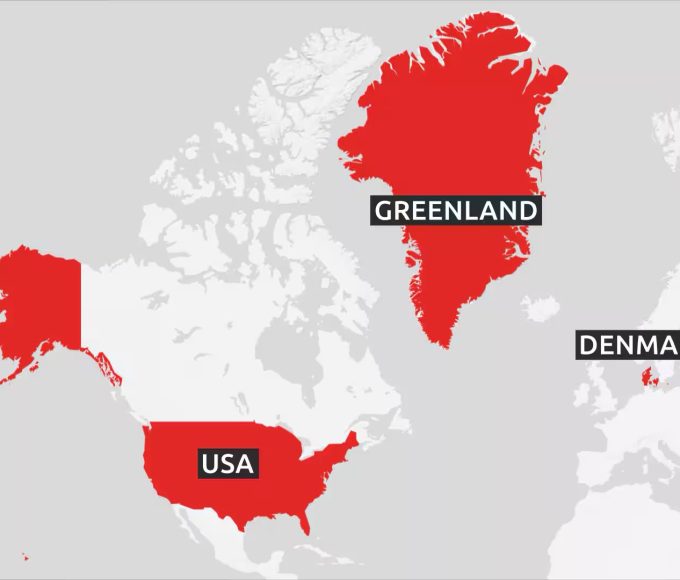


Leave a comment